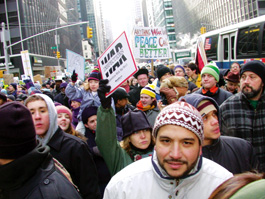home | north bay bohemian index | news | north bay | news article

DO WORRY, BE HAPPY: Taking it to the streets—or even penning a simple protest letter—leads to a better you.
Smile, You're an Activist
New study suggests that politically engaged people are happier
By Robin Petre
People engaged in political activism are more likely to live happier and more fulfilling lives than the average person, according to two psychologists writing in a recent issue of the journal Political Psychology.
"There is something about activism itself that is beneficial for well-being," says Tim Kasser, Ph.D., co-author of the research paper, which is based on studies of college students. "We found that activists felt they had better relationships, more purpose in life and they liked themselves better."
Kasser teaches psychology at Knox College in Galesburg, Ill. His collaborator, Malte Klar, is a professor at the University of Göttingen in Germany. Activism fulfills human needs on several levels. According to the study, it satisfies one's eudaemonic needs—the need for a sense of meaning and purpose to life. More superficially, it fulfills the hedonic need to feel pleasure.
Kasser says that activism "does a fairly good job at satisfying" the four psychological needs that must be met for a person to be happy: autonomy, competence, security and connection to others.
"I don't doubt that part of the reason activism is good for people's well-being is that they experience higher levels of connection to other people," Kasser says. "We are not trying to say that the only way to increase your well-being is through political activism, but we are saying that it is a good one."
Kasser resists the idea that activism should be a catalyst for anger. On the other hand, activism will benefit you no matter what the motivation. "You can be angry about some social injustice that you see, and if you engage in activism, it may not make your anger go away, but it seems like it provides you with other kinds of well-being, probably because you know you're trying to do something about the thing you're angry about," he says.
In their first two studies, Klar and Kasser measured two different kinds of activism. One is conventional activism, like marching on the street, signing a petition or writing a letter to your senator. High-risk activism, on the other hand, is engaging in radical behavior like directly confronting the police.
"High-risk activism showed to be a little positive, but not nearly as positive as conventional activism, which was consistently associated with being happier," says Kasser. He adds that activism is one area where the close connection between the individual and society is very clear. "The data show that it may improve your well-being," Kasser says. "[A] thriving democracy can only survive if the people are politically active."
Send a letter to the editor about this story.
|
|
|
|
|
|